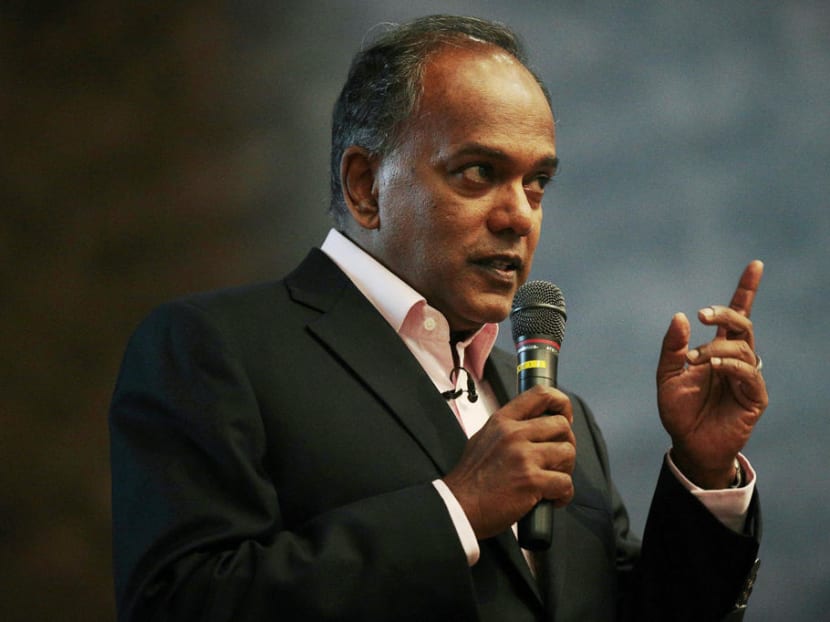In full: Ministerial statement on the City Harvest Church decision
Delivering a ministerial statement in Parliament on Monday (Feb 5), Law and Home Affairs Minister K Shanmugam said the Government disagreed with the apex court’s decision to uphold the reduced punishment for six former City Harvest Church leaders, and deemed the sentences for them to be “too low”.

Law and Home Affairs Minister K Shanmugam said the Government disagreed with the apex court's decision to uphold the reduced punishment for six former City Harvest Church leaders. Photo: TODAY file photo
Thank you, Mr Speaker, for allowing me to make this Statement.
INTRODUCTION
The Attorney-General's Chamber (AGC) made a Reference to the Court of Appeal (CA), on the City Harvest Church Case. Two questions were asked. On February 1 2018 last week, the CA released its decision on the Reference.
I want to set out the Government’s position, now that the CA has said what the law is.
SUMMARY OF COURT DECISION
The key question related to the liability of company directors, governing board members, key officers of charities, officers of societies who commit criminal breach of trust (CBT) of property, property which belongs to the organisation. What happens?
The CA ruled that such officers are liable to be punished under s406 of the Penal Code. That provides for a maximum sentence of 7 years’ imprisonment, or fine, or both.
The CA also ruled that these officers do not come within the term or meaning of professional “agent”, and therefore, they were not liable for the more serious penalties under s409 of the Penal Code for CBT. S409 provides for a maximum of life imprisonment.
POLICY PRINCIPLE
The Government’s policy is clear:
- If you are a senior officer, director in the organisation, you are in a position of greater trust. You have considerable authority to make decisions in relation to the organisation’s assets.
- If you abuse that trust, you should be more culpable, and you should be liable for more severe punishments, compared with an ordinary employee.
- That is really common sense and there can be no question about that.
HISTORY OF COURT DECISIONS
For the last 40 years, the law, as applied by the Courts, reflected this principle.
- In 1976, the High Court ruled so in the case of Tay Choo Wah. It said that directors are liable for the aggravated offence provided under s409.
- After that decision, the position was clear, settled law.
- The law was applied in that way for 40 years, by Courts in other cases. There are at least 16 decisions reported applying this principle, and there must be many other unreported decisions.
In April last year, however, the position changed. The High Court ruled that directors cannot be liable under s409. That was contrary to the decision in 1976, and the way the Courts have applied s409 over these 40 years.
The Government asked AGC what should be done and what further steps ought to be taken after the High Court’s ruling.
- AGC advised that a clarification should be sought from the CA by way of a Reference. We now had two conflicting positions from the High Court. One, Tay Choo Wah and the line of cases that applied Tay Choo Wah, and second, the City Harvest Church case where the Court disagreed with Tay Choo Wah.
- The CA gave its decision, as I said earlier, last Thursday, in response to the two questions of law submitted by the AGC.
RESPONSE TO COURT DECISION
The CA’s decision means that there is now a lacuna in the law.
- As it stands today, ordinary employees can be charged under s408 of the Penal Code. That provides for more serious penalties for CBT compared with s406. s408 is punishable by mandatory imprisonment for up to 15 years, and an optional fine.
- Directors, however, can only be charged under s406 which provides for a lesser punishment of up to 7 years’ jail, or fine or both.
- The CA itself acknowledged this gap in the law, and it said that there was no “good policy reason” to ignore the “heightened culpability” of directors and key officers of charities, societies, and companies who commit CBT.
- The CA also pointed out that the obligation of the Court is to set out the legal position correctly on what the law says, and leave it to Parliament to amend the law as it deems fit.
It is now up to Parliament to amend the law, and that, we should do soon.
- We will ensure that legislation provides for higher penalties for directors and other senior officers who commit CBT.
- We hope to make the amendment together with other wide ranging amendments to the Penal Code, which I have spoken about.
ADDRESSING PUBLIC SENTIMENTS
To the house, let me make one final comment. We are aware that many have expressed their dissatisfaction with the outcome.
Expressing one’s unhappiness with Court decisions is fine, but it should not sink to the level of abuse, insult and contempt.
- We have seen comments online that the judges let off those who are rich;
- That some judges were lenient because they were Christians and so on.
That is not right. Judges should not be personally attacked, their integrity impugned, just because people do not agree with their decision. There may be unhappiness. People are entitled to disagree with their decision. But let’s not attack the judges.
The Government believes that the sentences are too low. But the sentences reflect the law as it stands after the High Court’s decision last year, confirmed by the CA. The Courts decide these matters.
All of us have to respect the decision, regardless of whether we agree or disagree with it.
Thank you Mr Speaker.






